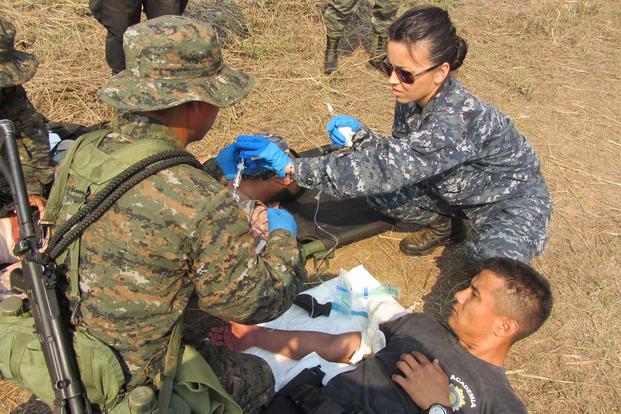Weeks after the Navy announced it was getting rid of its 241-year-old ratings system in an effort to make jobs more flexible and titles gender-neutral, the Secretary of the Navy hinted that one of the most beloved job titles might be renamed in the process.
Speaking at the National Press Club in Washington, D.C., on Wednesday in what will likely be one of his final public addresses, Navy Secretary Ray Mabus promoted the ratings overhaul as a way to allow sailors to seek employment outside their narrow job chimney and to make titles more gender-neutral as more service jobs open to women.
The change means enlisted sailors refer to each other by rank -- chief petty officer or seaman, for example -- instead of by rating, as they previously did.
Twice, Mabus referred to Navy hospital corpsmen as medics, using an Army word for its enlisted medical specialists.
"Ratings names change all the time," Mabus said. "Corpsmen, our medics, that rating came in after World War II. Corpsmen were first called Loblolly Boys, which, I'm not sure where that came from. I thought it was important to be gender-neutral."
The Navy considers the rating of corpsman to be 118 years old, dating from the establishment of the Navy Hospital Corps in 1898 with approval from then-president William McKinley.
"From that date to the present, either generically or by rating title, medical Sailors have been called 'hospital corpsmen,' " according to a history compiled by the independent website Corpsman.com.
But through World War II, combat corpsmen were known as pharmacist’s mates, a title that persisted until a 1947 reorganization of the Navy's hospital corps that resulted in the current title.
Mabus also announced that the Navy plans to train enlisted specialists, including those formerly known as corpsmen and aviation crews, to civilian certification standards.
"We'll train all our aircraft folks to [Federal Aviation Administration] standards. We'll train corpsmen, now our medics, to [Emergency Medical Technician] standards," Mabus said. "When you leave [the] Navy, when you leave [the] Marine Corps, a lot of times even though you've got the skill level, you don't have the certification. You can't get a job working at United Airlines right across the street. You need to start over. You can't get a job with an EMT crew. So those are the reasons we changed that."
Army medics are already trained to EMT standards, another indicator that the Navy may be taking a page from that service.
A spokesman for Navy Personnel Command, Lt. Cmdr. Nate Christensen, would not confirm to Military.com that the Navy was doing away with the 118-year-old title of corpsman in favor of the gender-neutral "medic."
He emphasized that the Navy is executing the first step of what will be a multi-year process to transition from the ratings system. Officials have previously said they are still determining whether to keep aspects of Navy tradition tied to the ratings system, such as the ratings badges on uniforms that indicate sailors' job specialties.
"The only thing that has changed right now is how we address each other," Christensen said.
He also cited comments that Chief of Naval Operations Adm. John Richardson made to Military.com in early October indicating that traditional honorifics, such as "Doc" for corpsman, will remain in use.
"The idea is that the official communication would be your rank, so you'd be seaman or petty officer or master chief, etcetera," Richardson said Oct. 3. "But I'll tell you what: On the battlefield, all those corpsmen are called 'Doc,' right. And so how that all transpires, we'll see. I'm not here to squelch any of that type of thing."
-- Hope Hodge Seck can be reached at hope.seck@military.com. Follow her on Twitter at@HopeSeck.



























